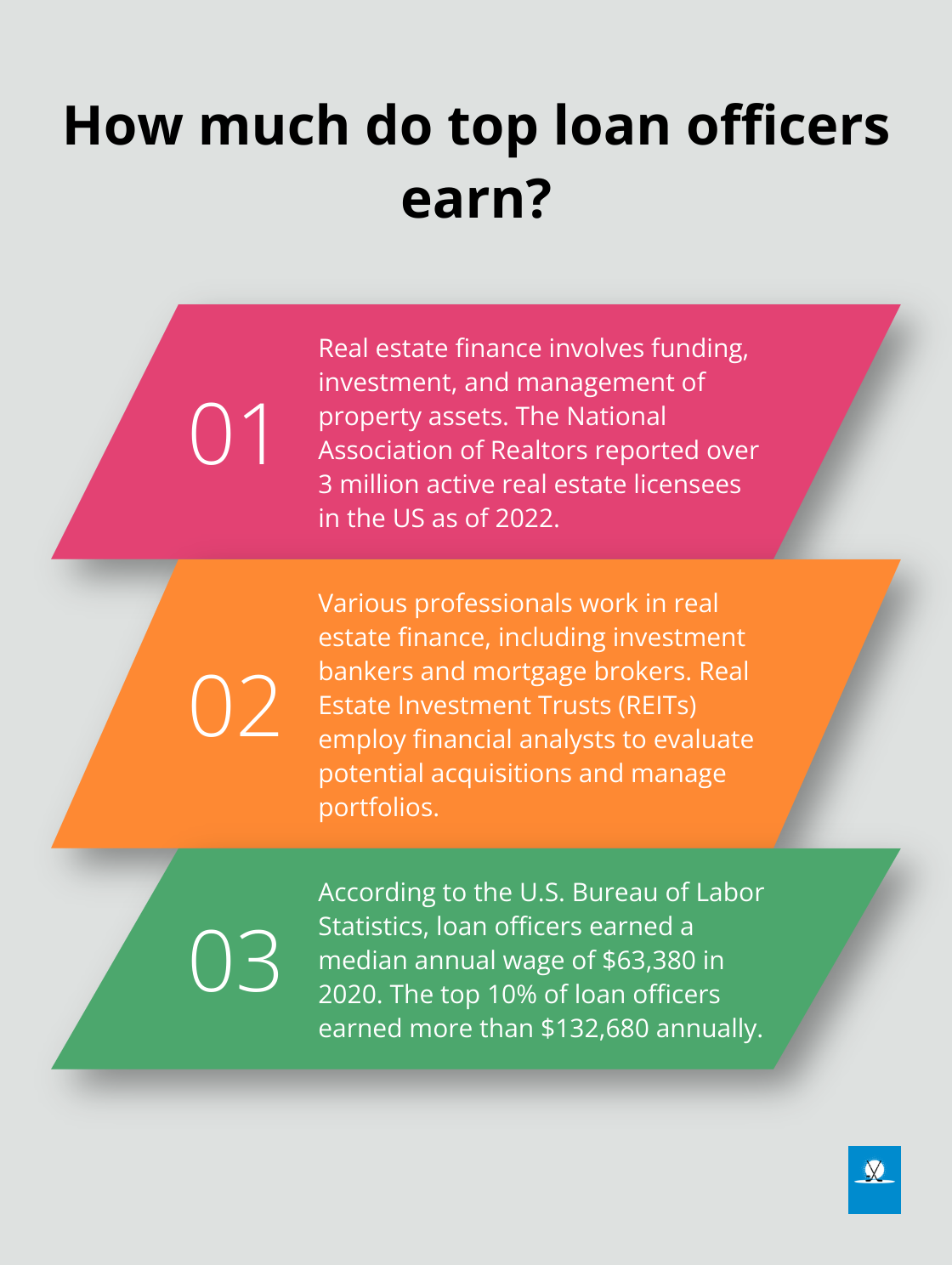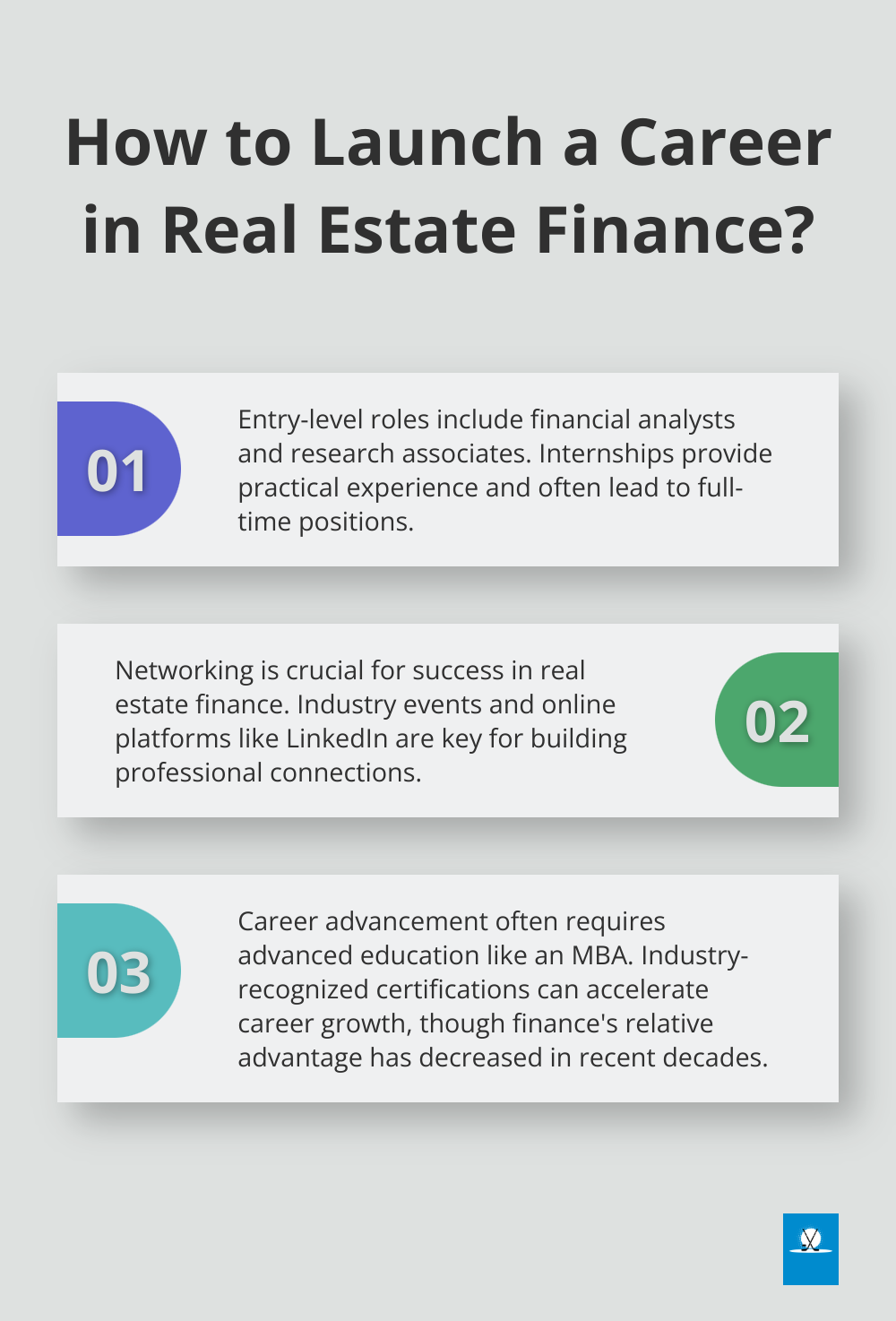At Pro Hockey Advisors, we understand the importance of diversifying career options. The real estate finance sector offers exciting opportunities for those seeking a challenging and rewarding profession.
In this post, we’ll explore the real estate finance career path, from essential skills to advancement strategies. Whether you’re a recent graduate or considering a career change, this guide will help you navigate the dynamic world of real estate finance.
What is Real Estate Finance?
Real estate finance encompasses the funding, investment, and management of property assets. It involves understanding money flows through the real estate market and leveraging financial tools for profitable decisions.
Key Players in Real Estate Finance
The real estate finance industry includes various professionals:
- Investment bankers facilitate large-scale property transactions (often worth hundreds of millions of dollars)
- Real estate analysts evaluate investment viability
- Mortgage brokers connect property buyers with lenders

The National Association of Realtors reported over 3 million active real estate licensees in the United States as of 2022 (including agents and brokers who work closely with finance professionals).
Career Paths in Real Estate Finance
Real estate finance offers diverse career paths:
- Real Estate Investment Trusts (REITs) employ financial analysts to evaluate potential acquisitions and manage portfolios.
- Commercial banks and lending institutions hire underwriters and loan officers to assess real estate loan risks. The U.S. Bureau of Labor Statistics reports that loan officers earned a median annual wage of $63,380 in 2020 (with the top 10% earning more than $132,680).
- Property development firms offer opportunities to work on projects from conception to completion, involving financial planning, risk assessment, and project management.
Skills for Success in Real Estate Finance
Success in this field requires:
- Analytical skills
- Industry knowledge
- Proficiency in financial modeling software (e.g., Excel and ARGUS)
- Certifications (such as the Chartered Financial Analyst designation)
Networking plays a vital role in real estate finance. Industry events, professional associations, and online platforms like LinkedIn provide valuable resources for building connections and staying informed about job opportunities.
The Importance of Diversification
While specializing in real estate finance can lead to a rewarding career, it’s wise to consider diversification. Exploring various financial sectors as part of a comprehensive career strategy can provide additional opportunities and stability. For those in sports-related fields, companies recognize the value of diversified portfolios and encourage clients to explore multiple avenues for career growth.
As we move forward, let’s examine the essential skills and qualifications needed to thrive in the real estate finance industry.
Essential Skills and Qualifications for Real Estate Finance
Educational Foundation
A bachelor’s degree in finance, economics, or real estate forms the baseline for entry into real estate finance. Many employers prefer candidates with a master’s degree in business administration (MBA) or real estate. The Mortgage Bankers Association reports that 72% of real estate finance professionals hold at least a bachelor’s degree.

Certifications can distinguish you from other candidates. The Chartered Financial Analyst (CFA) designation holds high regard in the industry, equipping you with real-world skills in investment analysis. For those who focus on commercial real estate, the Certified Commercial Investment Member (CCIM) certification proves valuable. These credentials demonstrate your expertise and commitment to potential employers.
Technical Expertise
Proficiency in financial modeling and analysis tools is essential. Excel remains the industry standard, but familiarity with specialized software like ARGUS and CoStar provides a competitive edge. A 2023 survey by Real Estate Financial Modeling revealed that 89% of real estate finance professionals use Excel daily, while 62% use ARGUS regularly.
Data analysis skills play a critical role. You must interpret market trends, property valuations, and investment performance metrics effectively. Python and R programming languages have gained popularity for advanced data analysis in real estate finance.
Soft Skills for Success
While technical skills matter, soft skills often determine long-term success in real estate finance. Strong communication skills prove essential for explaining complex financial concepts to clients and colleagues.
Negotiation skills become vital, especially when handling high-stakes property transactions. You’ll often mediate between buyers, sellers, and lenders. The development of these skills can significantly impact your effectiveness in the field.
Adaptability stands out as a key trait in the ever-changing real estate market. The ability to quickly adjust strategies based on market conditions, regulatory changes, and economic shifts is highly valued. The 2008 financial crisis and the recent COVID-19 pandemic have demonstrated how rapidly the real estate landscape can change, emphasizing the need for adaptable professionals.
Networking and Relationship Building
Networking skills cannot be overlooked in this relationship-driven industry. Attending industry events, joining professional associations, and maintaining a strong LinkedIn presence can open doors to opportunities. The Urban Land Institute reports that 65% of real estate professionals found their current job through networking.
As you develop these essential skills and qualifications, you’ll position yourself for success in the dynamic field of real estate finance. The next step involves understanding how to build and advance your career path in this exciting industry.
Launching Your Real Estate Finance Career
Entry-Level Opportunities
The real estate finance industry offers numerous entry points for aspiring professionals. Many start their careers as financial analysts or research associates. These positions provide a solid foundation in financial modeling, market analysis, and property valuation.

Internships are valuable for gaining practical experience and industry exposure. These programs often lead to full-time positions.
Building Your Professional Network
Networking is a cornerstone of success in real estate finance. Industry events, conferences, and professional associations provide platforms to connect with seasoned professionals and potential employers.
Online platforms like LinkedIn have become indispensable for career advancement. Maintaining an active and professional online presence can open doors to new opportunities and keep you informed about industry trends.
Advancing to Senior Roles
Progression to senior roles in real estate finance typically requires a combination of experience, advanced education, and specialized skills. Many professionals pursue an MBA or a Master’s in Real Estate to enhance their knowledge and credentials.
Industry-recognized certifications can accelerate career advancement. However, it’s important to note that while finance is still a good career path, it may not be as advantageous relative to other careers as it has been in recent decades.
Specialization in niche areas of real estate finance, such as sustainable development or distressed assets, can set you apart in a competitive job market.
Continuous Learning and Adaptation
The real estate finance industry evolves rapidly, influenced by economic shifts, technological advancements, and regulatory changes. Successful professionals commit to continuous learning and adaptation. This includes staying updated on market trends, mastering new financial modeling tools, and understanding emerging sectors like proptech.
Professional development courses, industry publications, and participation in thought leadership forums contribute to ongoing growth. The ability to adapt to changing market conditions and embrace innovation will position you for long-term success in this dynamic field.
Final Thoughts
A successful real estate finance career path requires education, skills, and strategic planning. Professionals must master financial modeling, data analysis, and soft skills to thrive in this dynamic field. The industry offers diverse opportunities, from investment analysis to property development, with entry-level positions and internships providing valuable experience.

Technological advancements, market shifts, and evolving regulations will shape the future of real estate finance. Professionals who adapt to changes and stay informed about industry trends will position themselves for success. Those aspiring to build a career in this field should seek mentorship and commit to ongoing learning.
At Pro Hockey Advisors, we understand the importance of strategic career planning and financial management. We encourage professionals in all fields to seek expert guidance in navigating their career paths. Success in real estate finance involves building relationships, demonstrating integrity, and continuously improving skills.


